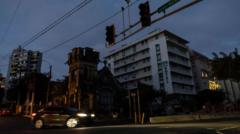In a startling turn of events, Puerto Rico was engulfed in darkness early Tuesday, December 31, as a nearly island-wide blackout struck the region. Initial investigations by Luma Energy, the island's primary power distributor, hinted at a fault in an underground line as the possible cause, forcing the company to predict that full service restoration could take anywhere between 24 and 48 hours. As of around 1000AST (1400GMT), only about 13 percent of the 1.4 million customers had regained power, according to the New York Times.
Gradually, some areas began seeing restoration, including San Juan’s municipal hospital, an indication of a slow recovery amid the chaos. The incident re-ignited fervent calls from elected officials and community members alike, highlighting the urgent need to address Puerto Rico's chronic energy problems that have persisted since Hurricane Maria wreaked havoc in 2017. "The island cannot continue to endure an energy system that more frequently fails its citizens," voiced Jenniffer González-Colon, Puerto Rico's US congressional representative and the incoming governor, in a message on X.
Governor Pedro Pierluisi echoed her sentiments, taking to Facebook to demand accountability and effective solutions from the major energy players, Luma and Genera. Power outages have plagued the island, leading to adverse impacts on its economy and quality of life. Earlier in the year, a June blackout left around 350,000 customers without power during a heat wave, and subsequent outages after Hurricane Ernesto in August affected more than 700,000 residents.
As news of the latest blackout spread, residents expressed their frustration to US media outlets. "These outages are part of my everyday life," reflected Enid Núñez, 49, in remarks to the Associated Press. Existing before Hurricane Maria, the power grid was already under strain, and while US government funding aimed to refurbish and improve the infrastructure, local reports indicate that progress has been hindered by difficulties in commencing construction and navigating FEMA's regulatory framework.
"Unimpressively, the power grid has still not recovered from the devastation caused by Hurricane Maria," tweeted Mark Levine, New York City's Manhattan borough president, emphasizing the plight of the Puerto Rican community—3.5 million American citizens that merit far better services. The voices of Puerto Rico's leaders and residents alike continue to resonate with clarity: decisive action is imperative for a more sustainable energy future.




















